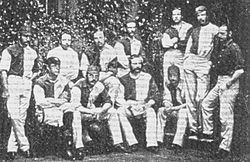Charles Mackarness
In his youth, he had been a keen amateur sportsman and played twice in the FA Cup Final for Oxford University, being on the victorious side in 1874 and runner-up in the previous year.
At the time of Charles's birth, his father was vicar at Tardebigge and then, from 1855, rector at Honiton in Devon, before being appointed Bishop of Oxford in 1870, a post he held until shortly before his death.
Queen's, however, were unable to raise the funds to travel to London and withdrew from the competition, giving Oxford a bye into the final.
[12] In the final, played at Lillie Bridge on 29 March 1873, the university met the defending champions, Wanderers who, under the original rules of the competition, were exempt from the earlier rounds.
[14] In a desperate attempt to secure an equalising goal, Oxford took the unusual step of dispensing with the use of a goalkeeper and moved Andrew Leach upfield to play as a forward.
[13] This plan back-fired at around the 80-minute mark, however, when Charles Wollaston broke through and scored a second goal for the Wanderers, who thereby retained the trophy.
[14] Ten minutes later, the university doubled their lead with a goal from Frederick Patton, after some skilful dribbling by captain Cuthbert Ottaway and Robert Vidal.
[25] During the First World War on 16 December 1914, St Martin's-on-the-Hill was one of many buildings in Scarborough which were damaged during the German bombardment of the town.
[27] Mackarness was appointed Prebendary (Canon) of York in 1896[9] and Archdeacon of the East Riding in 1898,[1] combining this with the care of his parish until his retirement.
[31] Her father was Rector of East Knoyle, Wiltshire[1] and her mother was the daughter of Charles Sumner, Bishop of Winchester and sister to Humphrey Milford, head of the London operations of Oxford University Press.

